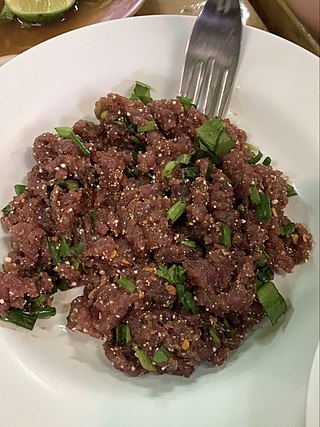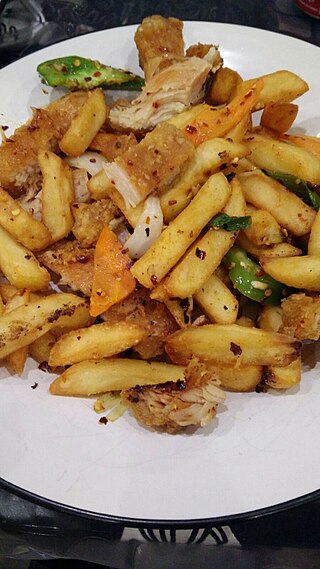LARP stands for live action role-playing game.
Larp may also refer to:
- Larp (dish), the national dish of Laos
- LHC Accelerator Research Program
- Laser activated remote phosphor
LARP stands for live action role-playing game.
Larp may also refer to:

A live action role-playing game (LARP) is a form of role-playing game where the participants physically portray their characters. The players pursue goals within a fictional setting represented by real-world environments while interacting with each other in character. The outcome of player actions may be mediated by game rules or determined by consensus among players. Event arrangers called gamemasters decide the setting and rules to be used and facilitate play.

A role-playing game is a game in which players assume the roles of characters in a fictional setting. Players take responsibility for acting out these roles within a narrative, either through literal acting or through a process of structured decision-making regarding character development. Actions taken within many games succeed or fail according to a formal system of rules and guidelines.

DISH Network L.L.C., a subsidiary of EchoStar, provides multichannel television and satellite television via DISH Network, mobile phone service via DISH Wireless, as well as over-the-top IPTV services via Sling TV.

Laab / Larb is a type of Lao meat salad that is the national dish of Laos, along with green papaya salad and sticky rice. Laab in the Lao language is a noun that refers to meat or other flesh that has been finely chopped and pounded. It is also considered a food of good luck in both Laos and Thailand because it has homonyms that mean 'lucky' in both languages, derived from लाभ in Sanskrit. Laab is of Lao origin, but is also eaten in other regions, most prominently the neighboring former Lan Xang territory, or modern day Laos and the northeastern and northern areas of Thailand, Isan and Lanna where the Lao have extended their influence. Other local variants of laab also feature in the cuisines of the Tai peoples of Shan State, Burma, and Yunnan Province, China.
Dish, dishes or DISH may refer to:

Upma, uppumavu, or uppittu is a dish of thick porridge from dry-roasted semolina or coarse rice flour. It originates from India, most common in Kerala, Andhra Pradesh, Tamil Nadu, Telangana, Karnataka, Maharashtrian, and Sri Lankan Tamil dish. Various seasonings and/or vegetables are often added during the cooking, depending on individual preferences.

Buddha Jumps Over the Wall, also known as Buddha's Temptation or Fotiaoqiang, is a variety of shark fin soup in Fujian cuisine. This dish has been regarded as a Chinese delicacy known for its rich taste, and special manner of cooking. The dish's name is an allusion to the dish's ability to entice the vegetarian Buddhist monks from their temples to partake in the meat-based dish, and implies that even the strictly vegetarian Gautama Buddha would try to jump over a wall to sample it. It is high in protein and calcium. It is one of China's state banquet dishes.

Chicken and waffles is an American dish combining chicken with waffles. It is part of a variety of culinary traditions, including Pennsylvania Dutch cuisine and soul food, and is served in certain specialty restaurants in the United States. Originating as a Pennsylvania Dutch meal, the dish has received notability in the Southern United States.

Live action role-playing games, known as LARPs, are a form of role-playing game in which live players/actors assume roles as specific characters and play out a scenario in-character. Technically, many childhood games may be thought of as simple LARPs, as they often involve the assumption of character roles. However, the scope of this article concerns itself mainly with LARPing in a technical sense: the organized live-action role-playing games whose origins are closely related to the invention of tabletop role-playing games in America in the 1970s.

Mikko "Mike" Pohjola is a Finnish playwright, novelist, and game designer. He is the author of Sinä vuonna 1928, 1827, Maailman hauskin, Myrskyn aika, Star Wreck Roleplaying Game, Tähti, Kadonneet kyyneleet, Ihmisen poika, and Age of the Tempest. He is also the narrative designer and main writer of the Agemonia board game.

Myrskyn aika is a Finnish role-playing game.
NERO International is a live action role-playing game (LARP) played in the United States. The NERO name originally was an acronym for "New England Role playing Organization", but the game has expanded well beyond its original New England roots and thus simply adopted the acronym as part of the official name.
Wyrd is a concept in Anglo-Saxon culture roughly corresponding to fate or personal destiny.

Knights of Badassdom is a 2013 American comedy horror film, directed by Joe Lynch, written by Kevin Dreyfuss and Matt Wall. It stars Ryan Kwanten, Steve Zahn, Summer Glau, and Peter Dinklage.

Koi is a "salad" dish of the Lao people living in modern-day Laos and Isan, Thailand, consisting of raw meat denatured by acidity, usually from lime juice. Common varieties include koi kung, with shrimp as the main ingredient, and koi paa /koi pla, which consists of minced or finely chopped raw fish in spicy salad dressing.

Emily Care Boss is an indie roleplaying game designer, theorist and publisher. She was a foundational member of The Forge, an early leader in the indie role-playing game movement and is considered the creator of the American Freeform genre of roleplaying games, which combine indie RPG principles and mechanics with Nordic freeform and American chamber live action role-playing techniques. She has been referred to as the "Dean" of the North American school of structured freeform game design.

A spice bag is a fast food dish, popular in most of Ireland and inspired by Chinese cuisine. The dish is most commonly sold in Chinese takeaways in Ireland. Typically, a spice bag consists of deep-fried salt and chilli chips, salt and chilli chicken, red and green peppers, sliced chili peppers, fried onions, jalapenos and a variety of spices. A vegetarian or vegan option is often available, in which deep fried tofu takes the place of the shredded chicken. It is sometimes accompanied by a tub of curry sauce.
The Masquerade is a 1994 live action role-playing game published by White Wolf Publishing.

DISH Wireless L.L.C., doing business as Boost Mobile, is a United States wireless service provider owned by EchoStar. It operates using the Boost, AT&T and T-Mobile networks to deliver wireless services. As of Q3 2023, Boost Mobile, along with its sister brands Gen Mobile and Ting Mobile had 7.50 million customers.